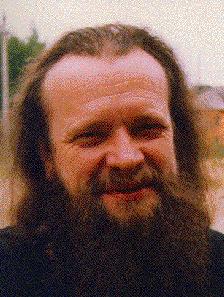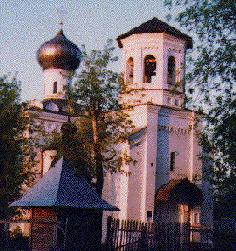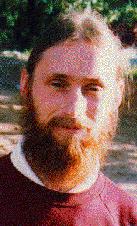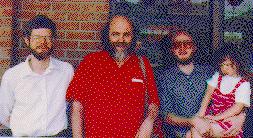

| Home Page |
Index |
Literary stuff |
Balkans |
Steve |
BBS page |
| Orthodox Church |
Russia |
Orthodox Faith |
Orthodox mission |
|
|
by Steve Hayes

|
I flew from Johannesburg to Moscow on 28-29 July and spent a week in Russia, and then travelled to the USA for the International Orthodox Mission Conference from August 6-11, and afterwards spent a few days doing research in St Vladimir's Seminary Library in Crestwood, New York before returning to Russia where I spent another week in Moscow before coming home.
The trip from Johannesburg to Moscow took 17 hours in an Aeroflot Ilyushin IL 62-M, with stops at Lome in Togo and Malta. It was quite fun to travel on that particular aircraft, built before the age of jumbo jets. The IL62 has four engines in the tail, like the Vickers VC10s that used to travel between London and Johannesburg in the 1960s. The only noticeable difference between the two aircraft is in the shape of the cockpit windows.
 |
The vigil was followed by supper, and then sitting around the camp fire where I was asked to talk about Orthodoxy in South Africa, and taught them to sing the Trisagion in Zulu. It was a warm summer night, and only began to get dark about 10 pm, and we went back to the church for evening prayers and preparation for communion, and finally got to bed around midnight.

|
I returned to Moscow, and stayed at the Danilov Monastery guest house. That was arranged by Andrei Kashinski, a former member of our parish in Johannesburg. Andrei's story is an interesting one. He had grown up in Belarus, and been a production manager in a factory. He was an active leader in the communist youth organisations. His wife left him, and he decided to go as far away as he could, and emigrated to South Africa. A week before he left, he was baptised in Moscow, but knew almost nothing about the Christian faith. When he joined our parish of St Nicholas of Japan in Johannesburg, he had to learn almost everything from scratch. After 18 months, he decided God was calling him to return to Russia and join a monastery, and so in December 1993 he returned, and went to the abbot of Danilov monastery and asked if he could sweep the church floors. The abbot asked him about his background and experience, and immediately put him in charge of the rebuilding programme of the monastery. He commuted each day to an office in the monastery, until the week I was there, when he began to live in the monastery itself, and could only leave the monastery with the blessing of the abbot. He was thinking of becoming a monk, but later decided not to, and got married instead, but he still works in the monastery. Andrei's story is not untypical of many young Russians in their 20s and 30s who were brought up as atheists, but are now joining the Church in great numbers.
I visited the St. Tikhon's Theological Institute - this began as a course of lectures on the Christian faith given in 1989. It proved so popular that it was repeated the following year, and in 1991 it was set up as a permanent institute. All its buildings are borrowed, however, and most of the staff lecture in their spare time - they are lecturers at the Moscow State University or other institutions, and their work at the Institute is unpaid. The Institute had over 1200 students, and is extending its work to other parts of Russia. It teaches theology, education (teacher training), mission and catechetics, church music, ikonography and embroidery. Most of the students are training to be church readers or choir directors, others will be school teachers, and some will be priests, deacons or evangelists. It is also engaged in research projects, one of them is research into the new martyrs. They have a computer database of many of the new martyrs, including photographs where they are available (from relatives, or the KGB archives). At Bytovo, near Moscow, for example more than 20000 people were killed in an 18-month period in 1936-37, more than 600 of them monks or clergy. Detailed records have been found for only about 800 of them.
 |
But it seems that the spiritual life of the Church is strong enough to withstand these pressures. Parish churches and monastery churches are full for weekday services as well as on Sundays - and that means a Vigil lasting almost three hours, and the Divine Liturgy lasting two hours, so that many ordinary lay people are in church for over four hours a day. I never once saw a Liturgy celebrated without a deacon. Many of the priests, deacons and lay people at the services are young. Many of the reports of church services during the Soviet period were that they were attended only by babushkas (grandmothers), and that it was only the grandmothers who kept the Christian faith alive. Today it is the reverse. Many of the young people in the churches are a disappointment to their grandmothers, who still stick to the old Marxist-Leninist ideology.
I met Sergei Chapnin and Fr Maxim Obukhov, whom I had communicated with by e-mail, and they helped by giving me quite a lot of information and enabling me to meet many interesting people. Fr Maxim Obukhov was priest at St Mitrofan parish, in the northern suburbs of Moscow. He is also active in the pro-life movement Zhizn.
 |
I travelled to the USA - a 10 hour flight, leaving Moscow at 11 am and arriving at New York at 1 pm - a long day. The mission conference at Holy Cross Greek Orthodox Seminary in Brookline, Massachusetts (near Boston) was very interesting indeed. Most of the big names in Orthodox missiology were there, including Bishop Anastasios Yannoulatos and Fr Michael Oleksa. Bishop Anastasios had brought a number of people from Albania with him, and parts of the services were sung in Albanian. It was, however, something of a shock to find pews in the chapel of a seminary!
I have reported on the content of the papers and what went on in the conference in more detail elsewhere but one interesting point was that the most controversial papers were from two recent Protestant converts to Orthodoxy, Frank Schaeffer and Dr James Cutsinger. Frank Schaeffer's paper was a sustained attack on American culture, and an appeal for the Orthodox Church to attack it aggressively - he called for an Orthodoxy "with teeth". Afterwards Bishop Ioann of Belgorad in Russia asked him if he was not afraid that those he was attacking might develop bigger teeth, and eat him up. Bishop Ioann said that the aggressive approach reminded him of the former KGB and communist youth members who were now advocating that non-Orthodox should be killed. "We call them Orthodox Bolsheviks", he said, and observed that that kind of attitude was reminiscent of that of the Grand Inquisitor in Dostoevsky's "The Brothers Karamazov" - whose ecclesiastical system had no room for Christ. Dr Cutsinger spoke on the question of salvation in other religions, and advocated an inclusive approach (as do many Western academic theologians), saying that adherents of other religions could be saved by those religions. His paper also provoked some sharp debate.
The question of the relationship between Christian faith and secular culture seems to have evoked different answers from Orthodox Christians, and I expect there to be a lot more discussion of it in future. Another question raised was that of the distinction between evangelism and proselytism. In Russia and other Second-World countries there has been an invasion of First-World culture and values, including religious proselytism. In Moscow there are McDonald's hamburger joints, and there are also many religious groups, particularly in America, who seem keen to export a kind of McDonalds spirituality - a brash, chrome-plated, quick-fix type of religion. Russian Christians are understandably upset about this, but one response, which I don't think is legitimate, has been to see each culture as a kind of ghetto, that must be protected from all outside influences. Therefore that kind of religion is OK for the West, where Orthodoxy does not belong, and such people must also leave Russia alone. Many of the people at the Orthodox mission conference in the USA were themselves converts to Orthodoxy from just such religions, and reject such ideas. There are also growing Orthodox Churches in places like Portugal and Indonesia - the former predominantly Roman Catholic, the latter predominantly Muslim. It is in those places, I believe, that the difference between evangelism and proselytism must be sought. In Portugal and Indonesia Orthodoxy was sought, not brought. It was natives of those countries who sought the Orthodox faith - they did not come from Greece or Russia or Romania, engaging in a kind of cultural imperialism.
 |
In my travels I saw three cities I had not seen before - Moscow, New York and Boston. They were different in many ways. Moscow was quite dirty, and many streets and buildings were in need of repair. But many buildings were also being repaired, especially the churches. It has a very good public transport system, and I really enjoyed hopping on trams, buses and the Metro (fare, 70c South African, about 20c US) to see the city. There are no more trams or trolley buses in South Africa, and as a former driver of trolley buses in Johannesburg, I enjoyed riding on them in Moscow for old times' sake. A tip for would-be travellers - if you ever visit Moscow, remember that you can travel from the airport to town for less than a US dollar. Just ignore the taxi touts (who will charge $50 or more) and walk through the parking area to the bus stop. Bus 551 takes you to the nearest Metro station for 2 taloni (tickets). Unlike American buses and trains, they are not air-conditioned, and you may have to stand in busy times, but if you're not rich it's worth remembering.
I think that of the three cities, I liked Moscow best, and it's the one I would really like to go back to. It was entirely different from my expectations. Most of the Bolshevik propaganda pictures show wide straight streets, and huge blocks of flats, to demonstrate the Bolshevik contribution to modernity. But it was not all that easy to find those scenes. Most of the parts that I saw had quite elegant tree-lined avenues, with mostly older buildings, the road curving tantalisingly out of sight in the distance, with little single-decker trams rumbling along them. Another thing that struck me was that there were even more flea-market stalls than in Johannesburg and Pretoria, and that nineteen out of twenty of them sold liquor.
Boston struck me as amazingly clean, and all the buildings seemed to be in incredibly good repair. I wasn't there long enough to see all that much of it (and the public transport system is not nearly as good as Moscow's), but it looked like a nice place to live if one had a well-paying job. I arrived there on a Saturday night, and spent the night with some South African friends living there, Dave and Jill Larcombe. On the Sunday, the day the conference started, I met no fewer than six people I already knew from e-mail correspondence - Archdeacon Roman and Norman Redington at Trinity Cathedral, where I attended the Divine Liturgy, and Harry Coin, Dr George Stevens, Thomas Emmanuel Philippakis and Fr Nicholas Szaruk at the opening meeting of the conference.
New York was quite fun in some ways, but also seemed a bit like a magnified version of Johannesburg. The people seemed larger than life - big and noisy and somewhat overpowering. There was some preparation for it at Moscow airport, while waiting for the plane - I was struck by how loud some Americans are - or at least New Yorkers. Every passenger boarding the flight who understood English would have known exactly what one of the passengers had done in Russia, and that he had been on a business trip to Siberia and didn't like Russian cooking, so the company had flown in a French chef for him. That, however, was just a preparation for landing at Kennedy Airport, where officious-looking men with loud voices were yelling at the passengers and telling them where to go.

|
A Protestant view on post-perestroika mission in Russia
If you would like to discuss this article, or other articles on mission and missiology, there are several electronic discussion forums on mission. There is also a discussion forum specifically for
There is more information on Orthodox mission on the Web pages of the Mission Society of St Nicholas of Japan.
| Home Page |
Index |
Literary stuff |
Balkans
Visit some of our other pages too!
| Orthodox Church |
Russia |
Orthodox Faith |
Orthodox Links |


Athens is a neighbourhood in Geocities - a fascinating concept of a virtual community. If you'd like to meet some of the other people in this neighbourhood, click here!You might even like to move in yourself.

Started: 1996-09-17
Updated: 2007-10-28